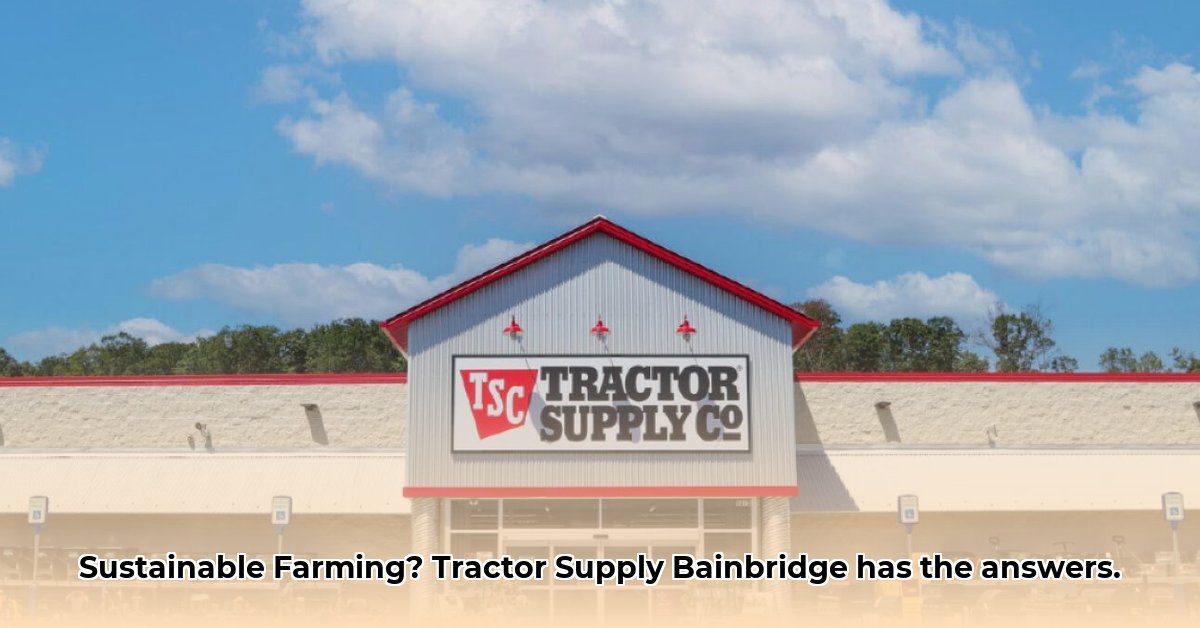
Tractor Supply Bainbridge: A Sustainability Assessment
Tractor Supply Company (TSC) in Bainbridge, Georgia, plays a significant role in the local agricultural landscape. This article assesses TSC Bainbridge's contribution to sustainable farming, identifying current practices, areas for improvement, and actionable steps for all stakeholders to foster a more environmentally responsible agricultural sector. We will focus on practical strategies and measurable goals to enhance sustainability within the Bainbridge community. For similar initiatives, check out this related store.
Tractor Supply Bainbridge: Current Sustainable Offerings
TSC Bainbridge offers various products supporting sustainable agriculture, including livestock feed optimized for animal health (reducing waste), durable fencing materials (protecting land), efficient water troughs (minimizing water waste), and organic soil amendments and pest control options for home gardeners. However, the extent of their commitment to sustainability remains unclear. Does the availability of these sustainable options truly reflect a company-wide push for environmental responsibility?
Gaps and Opportunities for Growth at TSC Bainbridge
While TSC offers some sustainable products, several areas require improvement. A lack of clearly defined sustainability goals hampers progress. Specific, measurable targets—such as reducing carbon emissions by a set percentage or increasing the proportion of sustainably sourced products—would demonstrate a tangible commitment. Furthermore, limited information on supply chain transparency hinders the ability to fully assess the environmental impact of their operations. Increased transparency builds trust with environmentally conscious consumers. Finally, more prominent display of sustainably certified products would make it easier for farmers to choose eco-friendly options.
Actionable Recommendations: A Multi-Stakeholder Approach
A comprehensive approach involving TSC, farmers, suppliers, and government agencies is necessary to achieve significant progress towards sustainable agriculture. The following actionable steps offer a roadmap for success:
1. For Tractor Supply Company:
- Comprehensive Impact Assessment: Conduct a thorough environmental and social impact assessment of all operations, from transportation to product sourcing, establishing a baseline for setting SMART (Specific, Measurable, Achievable, Relevant, Time-bound) goals. This will form the basis of a robust sustainability report.
- Develop a Sustainability Plan: Create a SMART sustainability plan with measurable goals, including, but not limited to, reducing carbon emissions by X% annually and increasing the proportion of sustainably sourced products by Y% within Z years. Regular progress reports are crucial for accountability.
2. For Farmers and Consumers:
- Educational Initiatives: Implement workshops, online tutorials, and in-store demonstrations on sustainable farming techniques such as crop rotation, water conservation, and integrated pest management. Practical, hands-on learning is key.
- Prominent Product Labeling: Clearly label and prominently display sustainably certified products with easily identifiable signage. This empowers consumers to make informed choices.
3. For Suppliers:
- Sustainable Supply Chain: Collaborate with suppliers to encourage sustainable practices, offering incentives for eco-friendly production and providing training on sustainable sourcing. This collaborative effort is vital.
- Code of Conduct Implementation: Establish and enforce a code of conduct for all suppliers, outlining sustainable expectations and conducting regular audits to ensure compliance.
4. For Government Agencies:
- Partnerships and Collaboration: Seek partnerships with local, state, or federal agencies for sustainable agriculture initiatives, including joint funding applications or participation in rural development programs.
- Grant Opportunities Exploration: Actively explore grant opportunities to support sustainable agriculture projects in the Bainbridge area.
Risk Assessment and Mitigation
Sustainable agriculture faces various challenges. The following table outlines key risks and mitigation strategies:
| Risk Factor | Risk Level | Mitigation Strategies |
|---|---|---|
| Overuse of Chemical Fertilizers | High | Promote organic fertilizers and soil amendments; provide education on soil health and nutrient management. |
| Excessive Water Consumption | High | Promote efficient irrigation techniques (e.g., drip irrigation); offer water conservation products and advice. |
| Pesticide Reliance | Medium | Advocate for integrated pest management (IPM); offer biopesticides and other pest control alternatives. |
| Soil Degradation | High | Promote cover cropping, crop rotation, and no-till farming; offer products and advice to improve soil health. |
| Reliance on Fossil Fuels | High | Promote the adoption of renewable energy sources on farms; offer energy-efficient equipment and resources. |
Regulatory Implications
Regulations concerning pesticide use, water quality, and animal welfare significantly impact TSC Bainbridge. Proactive compliance and transparent communication with regulatory bodies are essential to maintain a positive reputation and long-term viability.
Conclusion: A Call to Action for Sustainable Farming
TSC Bainbridge possesses the potential to become a leader in promoting sustainable agriculture. By implementing the strategies outlined above, TSC can minimize its environmental impact, enhance its brand reputation, attract environmentally conscious customers, and contribute to the long-term health of the local farming community. Collaboration and innovation are key to building a more sustainable future for agriculture in Bainbridge, Georgia.